Face masks, whatever you think of them, are a fact of life, thanks to the coronavirus epidemic. Aside from turning a trip to the grocery store into something more nearly resembling a horror movie, what does it mean for our children to be surrounded by people in face masks? Some experts say that not being able to see facial expressions may slow baby’s speech and social development, so it’s important that at least at home, where masks are unnecessary, parents spend more time reading to and talking with baby. Other experts are not so concerned, since babies are most often in situations where the adults who care for them are not wearing masks.
Infants and toddlers watch our faces for important clues about language and social situations. That is why it is so important that they can see our faces without anything getting in the way, for instance, a face mask that covers mouth and nose. But what happens when babies can’t see half our faces—our mouths, cheeks, and noses—in everyday situations?
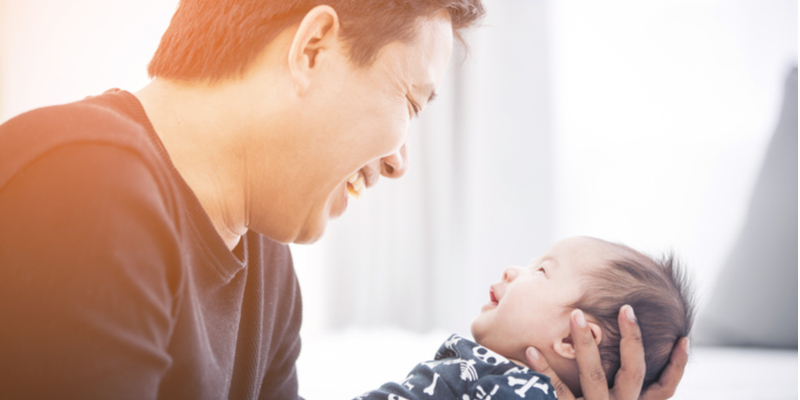
Erin Vollmer of TherapyWorks says that babies learn through watching and modeling—they copy what the adults around them do. When they can’t see our faces, it’s hard for babies to learn. “Focusing on facial expressions and facial movement is highly important when developing mirror neurons and ultimately speech and language skills. That’s why it is important that an infant see the face of their communicative partner when developing early speech sounds,” says Vollmer.
Face Masks Prevent Modeling
Of course the need for babies to see our faces is about more than imitating the sounds we make. Because babies, like all people, are social beings. And infancy is the time when nonverbal communication and social language development both begin. “At around 6 weeks of age, for example, babies will begin to smile,” says Vollmer. “It is imperative that infants are able to see and imitate the smile of their caregivers when developing this skill. There’s also no doubt that being able to see and clearly hear the production of speech sounds is imperative in early speech sound development.”
So what happens when infants look around during this global pandemic, and all they see is people in face masks? “Infants who are just learning to read facial expressions and verbal cues may have a more difficult time receiving that input clearly when people have their noses and mouths covered,” says Dr. Sean Paul, a child psychiatrist.
“Fortunately much of our perception of facial expression does come from the forehead, eyebrows, and eyes (even for smiles). For infants that are learning to speak, on the other hand, some of what they learn is from hearing sound and imitating the movements of the mouth they see, so in those cases a mask would muffle the sound and also make watching lip movements impossible.”
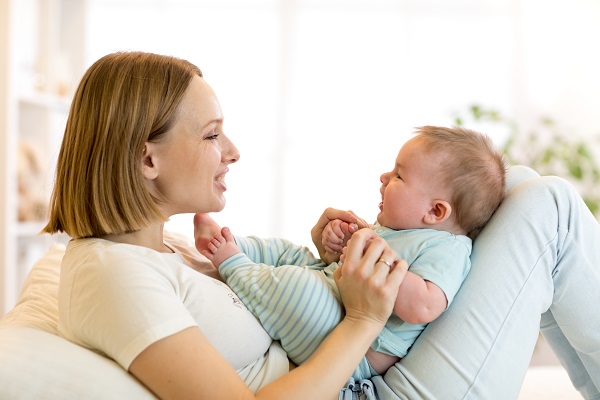
Face Masks Make Hearing Difficult
So are babies born during the corona epidemic doomed to lag behind in learning language and becoming social beings? Not necessarily. “We know from studies of blind infants and children that they are still able to develop emotionally and learn language without seeing the nose and mouth. It may be slightly delayed or more difficult, particularly if the child has issues with hearing since a mask makes it harder to hear clearly,” says Dr. Paul.
What can we, as parents, do to counteract the effects of faces partly hidden from baby? Dr. Paul suggests parents concentrate on spending more one-on-one time with baby at home, where there is no need for face masks. “Parents, when home with their children, can spend extra time talking face-to-face and showing them different facial expressions and sounds. Watching faces in books or videos can also be helpful, particularly if they are close up and demonstrating different emotions and sounds,” says Paul.
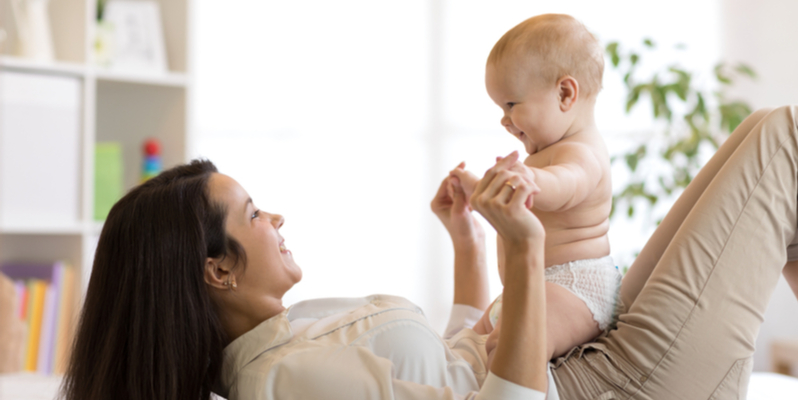
The good news is that Dr. Elizabeth Berger, a physician and child psychiatrist with 40 years of experience and a special interest in early language and social development, is not too concerned about the impact on babies of people wearing face masks. That’s because the important people in a baby’s life, for the most part, won’t be wearing them.
“The parents and care-takers who are involved with an infant on a daily and intimate basis are really at the helm of the infant’s emotional, social, and language development,” says Berger. “It is fortunate that these parents and caretakers are not going to be wearing face masks when they nurse, feed, kiss, and play lovingly with their new baby, except perhaps in the case of special medical circumstances (families are always advised to consult with their pediatrician or family doctor about the possibility of such circumstances, if there are questions about this).”
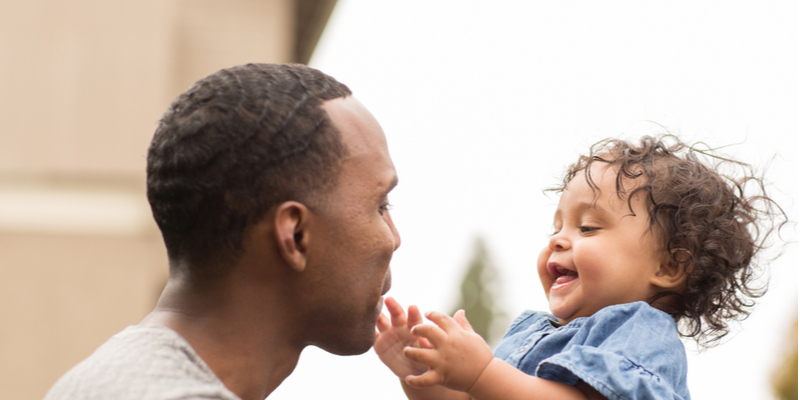
Newborns and the Mouth
“The newborn is highly interested in the mouth—both her own mouth and the mouth of other people,” says Berger. “So it is important for babies that mouths are right there to be touched, heard, and seen as part of ordinary living. At the moment, of course, infants may come into contact with many other people who do wear masks. This is not likely to have much impact on infant development however, since primary family attachments are where social-emotional-language development takes root.”
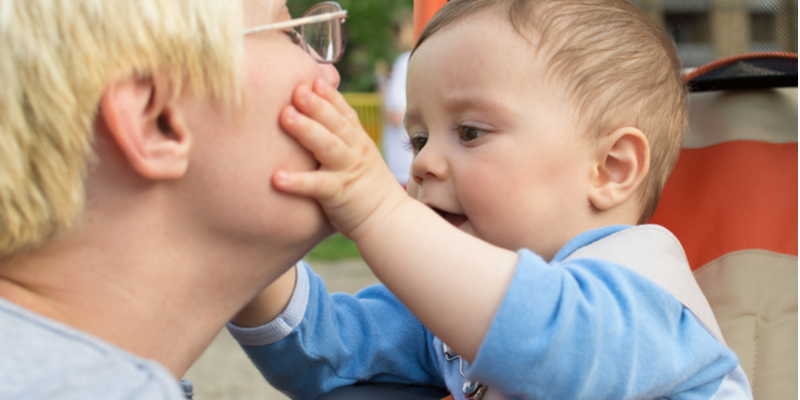
In a nutshell: Yes. It’s important for baby to see as many facial cues as possible and to hear what we say without any face masks getting in the way. In spite of the masks, however, our babies should be just fine. As long as we give children lots of face-to-face time with their parents at home, with no masks to interfere.
Reader Interactions
Comments
Trackbacks
-
[…] difficult to read. Babies learn to empathize and recognize emotions by seeing their parents faces. Masks will surely negatively impact this process. Above all, masks are dehumanizing. They are a symbol of the slave class, a muzzle. Masks are […]
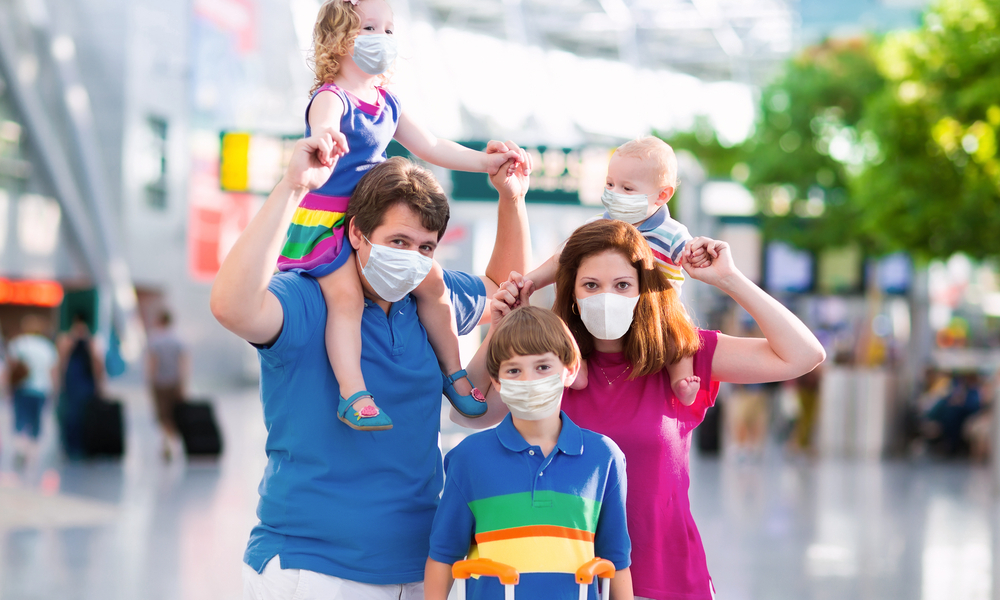
Saw this baby on the bus. Mum was wearing a mask and baby was really complaining. As soon as mum played a very quick peekaboo baby was happier. She said the baby hates the masks.